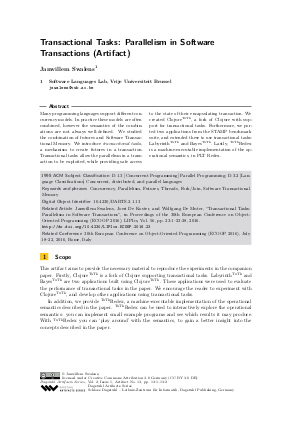Transactional Tasks: Parallelism in Software Transactions (Artifact)
Author Janwillem Swalens
-
Part of:
Issue:
Special Issue of the 30th European Conference on Object-Oriented Programming (ECOOP 2016)
Part of: Volume: DARTS, Volume 2 (ECOOP 2016)
Part of: Conference: European Conference on Object-Oriented Programming (ECOOP)
Part of: Journal: Dagstuhl Artifacts Series (DARTS) - License:
 Creative Commons Attribution 3.0 Germany license
Creative Commons Attribution 3.0 Germany license
- Publication Date: 2016-07-14
Artifact Description

PDF
DARTS.2.1.13.pdf
- Filesize: 351 kB
- 2 pages
Document Identifiers
Subject Classification
Keywords
- Concurrency
- Parallelism
- Futures
- Threads
- Fork/Join
- Software Transactional Memory
Metrics
- Access Statistics
-
Total Accesses (updated on a weekly basis)
0PDF Downloads0Metadata Views
Artifact
DARTS-2-1-13-artifact-e9d1951304299497e1a1942d9926fd0b.zip
(Filesize: 45.86 MB)
MD5 Sum:
e9d1951304299497e1a1942d9926fd0b
(Get MD5 Sum)
Abstract
Many programming languages support different concurrency models. In practice these models are often combined, however the semantics of the combinations are not always well-defined. We studied the combination of futures and Software Transactional Memory. We introduce transactional tasks, a mechanism to create futures in a transaction. Transactional tasks allow the parallelism in a transaction to be exploited, while providing safe access to the state of their encapsulating transaction. We created Clojure-TxTk, a fork of Clojure with support for transactional tasks. Furthermore, we ported two applications from the STAMP benchmark suite, and extended these to use transactional tasks: Labyrinth-TxTk and Bayes-TxTk. Lastly, TxTk-Redex is a machine-executable implementation of the operational semantics, in PLT Redex.
Cite As Get BibTex
Janwillem Swalens. Transactional Tasks: Parallelism in Software Transactions (Artifact). In Special Issue of the 30th European Conference on Object-Oriented Programming (ECOOP 2016). Dagstuhl Artifacts Series (DARTS), Volume 2, Issue 1, pp. 13:1-13:2, Schloss Dagstuhl – Leibniz-Zentrum für Informatik (2016)
https://doi.org/10.4230/DARTS.2.1.13
BibTex
@Article{swalens:DARTS.2.1.13,
author = {Swalens, Janwillem},
title = {{Transactional Tasks: Parallelism in Software Transactions (Artifact)}},
pages = {13:1--13:2},
journal = {Dagstuhl Artifacts Series},
ISSN = {2509-8195},
year = {2016},
volume = {2},
number = {1},
editor = {Swalens, Janwillem},
publisher = {Schloss Dagstuhl -- Leibniz-Zentrum f{\"u}r Informatik},
address = {Dagstuhl, Germany},
URL = {https://drops.dagstuhl.de/entities/document/10.4230/DARTS.2.1.13},
URN = {urn:nbn:de:0030-drops-61348},
doi = {10.4230/DARTS.2.1.13},
annote = {Keywords: Concurrency, Parallelism, Futures, Threads, Fork/Join, Software Transactional Memory}
}
Author Details
Related Article
- Janwillem Swalens, Joeri De Koster, and Wolfgang De Meuter, "Transactional Tasks: Parallelism in Software Transactions", in 30th European Conference on Object-Oriented Programming (ECOOP 2016), LIPIcs, Vol. 56, pp. 23:1-23:28, 2016. https://doi.org/10.4230/LIPIcs.ECOOP.2016.23
